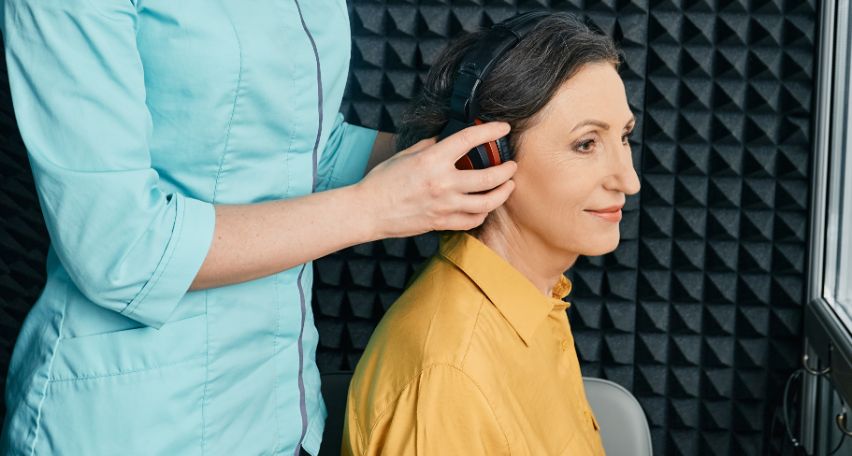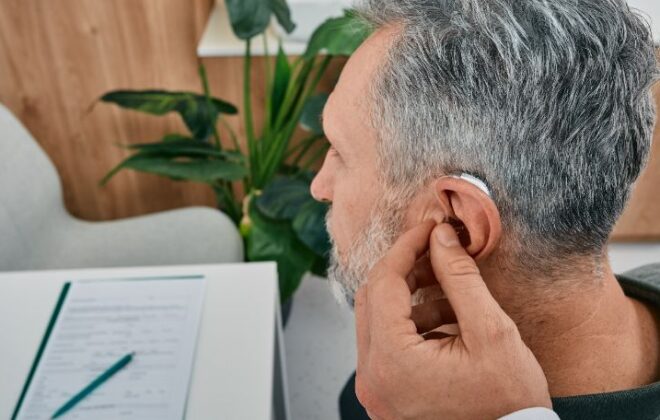Why Should Adults Go For Regular Hearing Check-Ups?
Older adults should go for a baseline hearing test and make it a habit to recheck it every few years. Though there are no hard and fast rules about when an older adult with no symptoms should go for their first hearing test and how often, it’s always better to make it a yearly routine to rule out age-related hearing loss. Even if you are below 60, it’s good to get a hearing screening done every few years if you’re exposed to sounds louder than 85 decibels.
Causes of hearing loss
Aging, injury, viral infections, and excessive noise exposure can all lead to hearing loss. Hearing loss is divided into five levels. They are mild, moderate, moderately severe, severe, and profound.
Hearing loss-types
In Mild Hearing Loss, people won’t be able to hear soft sounds. They can’t hear sounds like rustling leaves, birds chirping, or the refrigerator humming. They will have difficulty hearing speech in a noisy ambiance.
Moderate Hearing Loss causes difficulty hearing moderately loud sounds. People begin having difficulties with speech sounds, mainly the higher frequency sounds like /f/, /s/, and /th/. In general, hearing speech with background noise becomes extremely difficult.
Moderately-Severe Hearing Loss causes difficulty hearing even normal conversation in quiet surroundings. They will only be able to hear if the other person raises their voice. They will have problems in groups as they can no longer listen to sounds below an average conversation level.
Severe Hearing Loss creates a communication boundary. People suffering from severe hearing loss won’t hear speech sounds unless they are produced very loudly. Often people need help participating in a group conversation, as listening and following along requires a lot of effort.
In Profound Hearing Loss, some loud noises are still heard. However, communication is only possible with increased effort.
When the testing and screening process is conducted and hearing loss is confirmed, one need not worry. If you already know you have hearing loss, you should get your ears tested from time to time. Your hearing aid provider will help you schedule the same at needed intervals. If you feel there is a change in your hearing at any time, it’s a good idea to get it checked immediately.
And there is a reason for this. Hearing loss is not static. Sometimes the changes can be so subtle that you may not notice them, and your loved ones probably won’t. Hearing loss can get worse over time for most people.
Check your hearing aids
If the hearing loss deteriorates, you will eventually need to have your hearing aids adjusted. If your hearing aids are not working as they used to, or if your hearing loss has become severe, you may need a new pair of hearing aids.
Since hearing loss can affect your health and quality of life, it is best to catch hearing loss early. Hearing aids offer many benefits that overcome the impact of hearing loss.
The lifespan of a hearing aid is usually three to seven years. If you have a bone-anchored hearing system, you should check with your doctor to determine how often you should get your hearing tested.
Screening for infants and children
Newborns, infants, and school-age children are often screened for hearing loss. The same applies to adults, but often adults shy away from getting it done.
Your hearing is tied to the quality of life, from little things impacting your daily to more significant issues affecting your long-term physical and mental health. In case no problems are found with your hearing, you can be happy and continue living your life without any concern.
Get in touch with your local hearing professionals or audiologists you can reach out to and partner with to ensure that your ears are working fine with or without hearing aids, as is the case.




